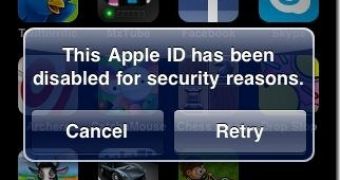It seems that Apple is taking steps in keeping jailbroken devices from accessing the iTunes App Store, the place where Apple customers can legally download and use applications on an iPhone, or iPod touch. While not confirmed as widespread, the banning is done per Apple-ID, suggesting Apple has begun to make investigations.
Redmond Pie warns, “[...] It looks like Apple has started banning iPhone hackers from the iTunes App Store.” The report points out to a Twitter post by Sherif Hashim, the iPhone developer and hacker who recently found an exploit in the latest iPhone OS 3.1.3 firmware. Hashim claims to have been banned by Apple for what the company called “security reasons.” To be noted that Hashim’s exploit could enable the unlock on 05.12.01 baseband for the iPhone 3G and iPhone 3GS. Pictured above is what Sherif got when trying to access the iTunes App Store from his iPhone.
Following these events, Sherif posted the following message on his twitter account: “'Your Apple ID was banned for security reasons,' that’s what i get when i try to go to the app store, they must be really angry [...] and guess what my apple ID was, '[email protected],' what a fool was me not to notice [...] can’t help laughing, they are babies [...]. ”
iPhone hacker iH8sn0w, who is responsible for the Sn0wbreeze Windows jailbreak solution (an alternative to PwnageTool), also seems to have been banned for security reasons. He reportedly confirmed the same actions from Apple saying that his Apple ID was banned following the release of XEMN.
Redmond Pie tries to make a connection between the hackers’ activities and Apple’s move to ban them, although it may just be that Apple has started banning jailbreakers worldwide, regardless of what they do in their spare time.
A year ago, Softpedia reported that a legal representative from the EFF, Fred von Lohmann, said that Apple had filed new comments with the Copyright Office as part of the 2009 DMCA, stating that jailbreaking an iPhone or iPod constituted copyright infringement and a DMCA violation. Apple has often marched for legality regarding its App Store, although few consider its own policies fair for all parties.
According to the EFF, Apple had kicked off its copyright-infringement claim with the observation that jailbroken iPhones depended on modified versions of Apple's bootloader and operating system software, adding that, “Opening the iPhone to independently created applications will compromise safety, security, reliability, and swing the doors wide for those who want to run pirated software.” While the EFF acknowledged most of these aspects, it didn’t want to submit to Apple’s entire set of observations regarding the process of “jailbreaking” a device.
Whether or not Apple has started taking steps on its own, in preventing jailbreakers from entering the App Store, remains to be confirmed. In the meanwhile, those who’ve noticed any strange behavior on their iPhones lately are encouraged to drop us a line.

 14 DAY TRIAL //
14 DAY TRIAL //